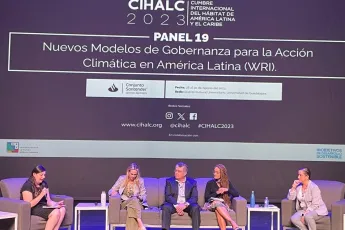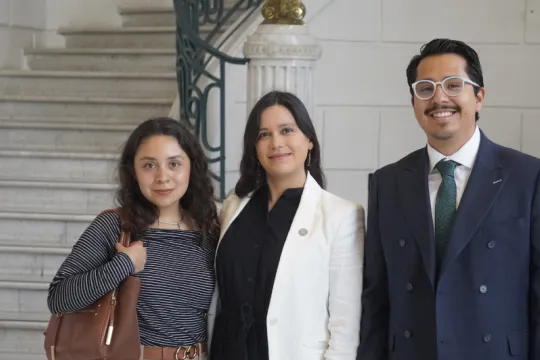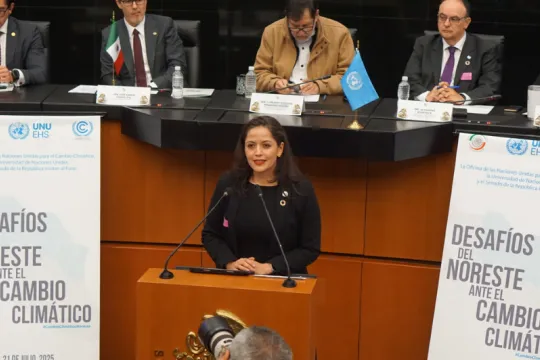
Mariana Campos of WRI Mexico presents TUC at the New Governance Models for Climate Action in Latin America event. © WRI Mexico
Representatives of the coalitions of León and Naucalpan in Mexico and Teresina and Recife in Brazil presented the progress attained by the Urban Labs at the end of last August. As an initiative implemented in these five cities that is part of the TUC, financed by IKI Alliance Mexico, it engages public authorities, organizations and academics in the neighbourhoods’ decision-making processes.
The panel “New governance models for climate action in Latin America”, part of the International Habitat Summit for Latin America and the Caribbean that took place in Guadalajara, included Isabella de Roldão, vice mayor of Recife; Óscar Zarate, advisor to the mayor of Naucalpan de Juárez; Margarita Eugenia Méndez Torres, vice president of the Environment of the Chamber of Commerce, Services and Tourism (CANACO) of León; and Marcia Regina de Alencar, coordinator of the Coopcata cooperative of Teresina. The panel was moderated by Mariana Campos, urban development manager at the World Resources Institute Mexico (WRI Mexico).
During the panel discussion, participants shared their experiences on collaborating with key actors from different sectors in implementing collaborative climate solutions agreed upon at the local level. They reported that the governance models supported by TUC have been operating for over a year and provide an example of the challenges and benefits of close intersectoral collaboration in attempting to transform cities on the path towards decarbonization. Additionally, they shared experiences and lessons learned from public, private and civil society actors in four Latin American cities, providing evidence and inspiration on how alliances can drive an agenda towards more sustainable and equitable cities.
The International Habitat Summit for Latin America and the Caribbean brought together experts, academia, the public sector and interested parties from the region to facilitate dialogue and collaboration around habitat solutions. This edition focused on the challenges of coexistence and new alliances for a shared habitat. The objective of the event was to fully recognize the particularities of Latin America, considering both its strengths and the problems and diversities inherent to its habitat, territories and communities. It intends to achieve, promote and consolidate the formulation of "New Shared Agendas" that can be effectively carried out in the Latin American and Caribbean Region.

